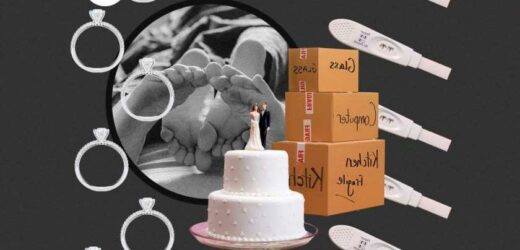Written by Poorna Bell
As her debut novel In Case Of Emergency is published, author and journalist Poorna Bell reflects on her decision to step off the ‘relationship escalator’ and embrace ethical non-monogamy.
“I don’t believe in a happy ending,” I said to a friend of mine as we drank prosecco from paper cups, experiencing the kind of vivid orange and pink sunset that ironically looked exactly like the sky in a romantic film. We were in the park – one of many that would act as a proxy pub/toilet/social space in the post-lockdown summer of 2020 and we had just been discussing the likelihood of finding romance after the pandemic. Her face crumpled, and I instantly felt bad, as if I’d just told a child Santa Claus didn’t exist.
“What do you mean?” she asked, a defensive wrinkle marking her brow.
“I just don’t know that it is possible to sustain one singular romantic relationship for most of your life,” I replied. “And I don’t know if I want any of it – marriage, kids, the whole lot.” Her silence as we sipped our wine conveyed her disagreement, and eventually the conversation moved on to something else, possibly Rishi Sunak’s eyebrows or wondering when offices might reopen.
I knew, however, that my friend was wondering if I was being nihilistic towards romance, because I was widowed at the age of 34 in 2015 when I lost my husband Rob. But I knew that I wasn’t. For a while I had been feeling like I didn’t fit in anywhere when it came to dating and relationships. I didn’t want to casually date without any meaningful connection, but I also didn’t know if I wanted to commit to finding a long-term relationship either. Most of my straight friends were either married, with kids or both – and while I loved that it fulfilled them, I rarely looked at it and wanted it for myself. Every time I’d voice my opinion about not wanting to get remarried, or that I probably didn’t want children, I’d receive a faint smile and “you might change your mind”.
At the age of 41, I feel I know my own mind. It wasn’t until months later, however, that it began to open up to the possibility of approaching dating differently – it was early one morning and, out of boredom, half asleep, I swiped on a man named Stefan’s* profile on Tinder. I saw that he was in an open relationship, which meant I normally would have avoided him, but something in me was intrigued and we started chatting. The first thing I noticed was that this was the most normal conversation I’d had in years with a guy on Tinder. He was respectful and a good communicator about everything from organising a meet-up to the boundaries of his relationship with his partner.
My first impression when we met was that I was dealing with someone who was transparent and honest and, above all, respectful. At the time social distancing was in force, and on our date he checked in with me – from whether I was comfortable with how close we sat to each other, to bringing a wine brand he knew I liked. It sounds utterly tragic to have to praise that, when respect should be such a baseline quality. But it often isn’t, especially on dating apps. While things fizzled out between us, his approach to relationships had piqued my interest.
It was evident that if I was going to consider dating people in open relationships (also known as ethical non-monogamy or ENM, an umbrella term which covers everything from polyamory to occasional sexual or non-sexual relationships outside of a primary relationship), I needed to know more. I spent hours on Google exploring the concept and, eventually,came across a term that finally made sense of why I was struggling with going back on the traditional path of dating: the relationship escalator.
Coined by author and journalist Amy Gahran, who wrote a book called Stepping Off The Relationship Escalator, it refers to the heteronormative behaviour and choices that take place in sequence for your relationship to have legitimacy in society. It starts with dating, becoming sexually and emotionally monogamous, defining the relationship, moving in together and combining finances, getting engaged, married and having children. “OMIGOD!” I yelled. I had never understood exactly why I had certain expectations around my romantic life or where they came from. It made total sense that I’d want to reject them after Rob died because it didn’t deliver what it promised: safety and security, that if I followed the steps I’d have everlasting happiness.
Gahran posits that relationships which sit outside of that progression are frowned upon and discouraged by society. It might include something big like non-monogamy or it might be small things such as having sex on the first date, having a break in the relationship or living in separate accommodation if you’re together long-term. When we hear that a person in a long-term relationship lives apart from their partner, for instance, the automatic assumption is that something must be wrong.
It’s also sexist because domestic success is still the dominant pressure for women versus economic success for men. The idea that then follows is that we must invest more time and effort into ascending the escalator, and that perpetuates certain tropes – women being obsessed with weddings, for instance, or feeling pressured to make relationships work because of the stigma we’ll suffer if it doesn’t succeed. Given that this way of thinking about relationships has been around since the 50s – giving nuclear families their best chance of success by creating safety, structure and stability within a small, core unit – it is hardly surprising that it no longer works for some. Women’s roles are vastly different in the workplace and at home these days – including basics such as voting rights and financial freedom.
Shortly after my lightbulb moment, I went back on Tinder, but this time it felt different. I’d become hyper-aware that clear, open communication and respect was now a must – regardless of whether the encounter was casual or significant. It eliminated a lot of people – the ones who were too vague about what they wanted, who wouldn’t arrange to meet up or who seemed immature.
Eventually I decided to move over to the dating app recommended by a friend, which is a mix of people who want monogamy and those looking for other people who are also ethically non-monogamous. After a few dates – and also fairly open conversations with people – I discovered I’m definitely not polyamorous. When I love someone, I need that relationship to be monogamous. But I also found that I’m comfortable and happy casually dating people who are both single and in ENMs. Although it might seem like unsexy admin, I really enjoy the open discussion around how I like to communicate, what my boundaries are and the kind of dates I enjoy.
Not everyone is open to it, though. “Isn’t it just people cheating?” a friend asked after my second ENM date with a guy named Evan, who I was completely smitten with last summer. I was talking about my plans to see him again. “Well, no,” I replied. “Cheating is when one partner doesn’t know the other person is seeing someone else. ENMs are always consensual, and they are usually defined by rules and boundaries.” In fact, I have found the communication within them to be gold-standard because it has to be, otherwise the relationship doesn’t function. It also means that you have to properly confront things like jealousy, which is often about your own insecurities and issues, versus the actual person. I realised that while I used to be a jealous person in my 20s, I’m not in my 40s and a huge part of that is due to a stronger sense of self-worth and trust in my own ability to walk away from a toxic situation.
Since opening out the type of people I date, and removing monogamy as a dealbreaker, I feel an incredible sense of relief. The escalator, I’ve found, doesn’t allow for nuance, queerness or people who have been failed by it in the past, and places a ton of morality and judgment on people who reject it. Intimacy exists in all forms, and I’ve met a few people who I’ve had a deep connection with, even if the relationship has been casual. It doesn’t mean that I’m not open to a deep or long-term connection – far from it. I have a huge capacity for love and that door will always remain open.
The biggest clarity it has given me, though, is around what I want for my dating life, which is to date with an open mind. If the other person seems like they might be best suited to a casual connection, then that’s the path we’ll go down. I don’t just date someone because they’ve asked me out either, I need to feel excited by the prospect of meeting them, or have my interest piqued by their personality. If they are looking for something more significant then I keep an open mind and explore that too – but these connections are more rare.
Of course, there are days when I sometimes struggle and miss not having a partner to share things with, like a bad day at work or chatting about what to make for dinner. But I also know that being in a relationship is a huge endeavour, and the fusion of two lives is not a trivial thing. It carries enormous joy, but it also requires continual sacrifice and compromise around finances, domestic labour and career.
Although I loved Rob with all my heart, I have no desire to get back on that escalator again. I think it can work for some, but for me, it feels like someone pressing me back into a box that no longer fits. I’ve altered my viewpoint since that day in the park with my friend – what was making me unhappy wasn’t the idea of marriage or kids, it was the idea of getting back on a path I didn’t believe would lead to my own personal version of happiness. That, as it turns out, includes dating and loving all kinds of people, because it amplifies the amount of love in my life, versus trying to pin it down in one place.
Death has taught me that at the end, there is one chance to do the things you love, and to live the life you want, because you don’t always get the life you expect.
In Case of Emergency by Poorna Bell (£14.99, Century) is out on 7 July
*Names have been changed
Source: Read Full Article



